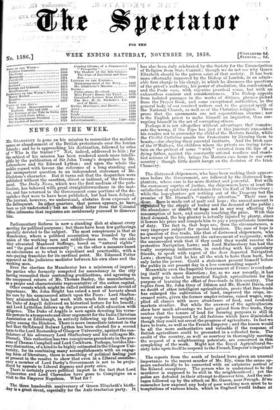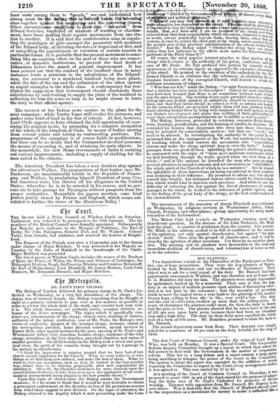NEWS OF THE WEEK.
Xt. GLADSTONE is gone on his mission to reconsider the mainte- nance or abandonment of the British protectorate over the Ionian Islands; and he is approaching his destination followed by cries of " Who is the traitor ?" Not, indeed, addressed to him ; for the subject of his mission has been rendered much more intelli- gible by the publication of Sir John Young's despatches to Mr. Labouchere and Sir Edward Lytton ; and upon the whole the public regard with favour the reference of a long standing and not =important question. to an independent statesman of Mr. Gladstone's character. But it turns out that the despatches were published without the sanction, direct or indirect, of the Govern- ment. The Daily News, which was the first medium of the pub- lication, has behaved With great straightforwardness in the mat- ter, and has returned to the Government some portions of the de- spAches that were to have been published, but had been delayed. Thejournal, however, we understand,-abstains from exposure of the delinquent. in Other quarters, that person appeartja have. been as yet 'undetected ; but an official letter from the Colonial' Office intimates that inquiries are assiduously pursued to discover him.
Parliamentary Reform is now a standing dish at almost every meeting for political purposes ; but there have been, few gatherings specially devoted. to the subject. The most conspicuous is that at Blanchester, where a political association was founded by the union of the working men and middle-class men. On one side they advocated. Manhood Suffrage, based on "natural rights"
and " the good of the community"; the other a measure based on calculations as to what is expeient and practicable, with a rate-paying franchise for its cardinal point. Mr. Edmund Potter appeared as the judicious mediator between his own class and the working men.
Even the election for Manchester has a minimum of import ; the parties who formerly competed for ascendancy in the city having reconciled their contending predilections, and agreeing in the unopposed return of Mr. Thomas Bazley, the manufacttrer, as a proper and characteristic representative of the cotton capital. Other events which might be called political are almost devoid of importance. Mr. John Bright has raised a nest of hornets about his ears by his unmeasured attack upon the Peers : Lord Shaftes- bury admonished him last week with much force and weight; the Duke of Argyll delivered an historical lecture for his benefit; and Lord Lyttelton follows up the process of adult education with diligence. The Duke of Argyle is seen again devoting his versa- tile powers to a temperate and clear argument for the India Christian Association at Edinburgh, in actively following up the Lawrence policy among the Hindoos. There is more immediate interest in the fact that SirEdward Bulwer Lytton has been elected for a second term to the Lord Rectorship of Glasgow University, against the can- didature of his adversary Lord Shaftesbury and his colleague Mr. Disraeli. This reelection has two conspicuous precedents in the per- sons of Thomas Campbell and Lord Cookburn. Perhaps, besides lite- rarydistinction, of a kind to be highly estimated inthe Glasgow Uni- versity, for its combining many accomplishments with an engag- ing form of literature, there is something of political feeling 4ust at present in the resolve to show that even in' a Mberal oonatatu- eney a member of Lord Derby's Government is not to be preju- diced by appeals to Liberal dogmas and party cries.
There is certainly grave political import in the fact that Lord • Palmerston -andLord Clarendon have gone to Compiegne on a visit to the Emperor Napoleon. What for ?
The three hundredth anniversary of Queen Elizabeth's biith- uay is a great event, especially for the Anti-traetarian party. It has also been duly celebrated by the Society for the Emancipation of Religion from State Control ; though we do not see why Queen Elizabeth should be the patron saint of that society. It has been more effectually improved by the Bishop of London, in an admir- able first charge to his clergy, in which he discusses the questions of the priest's authority, his poWet of absolution, the confessional, and the Poole case, with vigortins 'practical sense, but with' an exhaustless candour and considerateness. The Bishop appeals from isolated passages in the works of divines, phrases picked from the Prayer Book, and some exceptional aUthorities, to the general body of our received writers and to the general spirit of the National Church, as well as of the Christian religion. ' These prove that the sacraments are not superstitious charms ; nor is the English priest to make himself an inquisitor, thus oot- ruptin,g himself in the act Of corruptino. others. • Perhaps it is not altogether without advantages that eomppn- sate the wrong, if the POpe has just at this juncture announbed his resolve not to surrender the child of the Mortara family, while the Ciciltcl CWttolica assails the Protestants by likening them to beasts,—for obeying their parental instincts. And the Irish ease of the O'Malleys, the children whom the priests are trying totite- tain on the pretext of some "wish" extorted from the lips df a dying father, against the constantly uttered resolves and stead- fast actions of his life, brings the Mortara case home to our'own oountry ; though little doubt hangs on the decision of the Irish Chancery.
Tho distressed shipowners, who have been making their appear- ance before the Government, are followed by the distressed 'hop- planters, whose case is far more distinct and powerful. But with the customary caprice of justice, the shipowners have at least the satisfaction of epistolary condolence from the Earl of Malmesbury ; while the hop-planters get nothing out of the Treasury but the promise of Mr. Disraeli's " anxious attention." Their case is clear. seer-is made-out of malt and hops ; the annual amount is regulated by the' supply of barley and the demand of the public ; the abundance or dearth-of hops not in any way. affecting the oonsumption of beet, and scarcely touchingthe price. With this fixed demand, the hop plantet is actually injured by plenty, since it lowers his price and compels him to pay a propOrtionate increase of duty. The fact is, that hops are, from the circumstances, a very improper subject for special taxation. The case of hops is -no question of free trade, like that of distressed shipowners, -who leave urged upon Government the enforcement of reciprocity,. with the unconcealed wish that if they could they would recover the protective Navigation Laws ; and Lord Malmesbury has had the really surprising indiscretion, in condoling with his epistolary friends, to speak with regret of the dear departed Navigation Laws ; showing that he has all the wish to have them back, but only lacks the power.: Could a statesman present himself before the public in our present day in a less commanding aspect? Meanwhile even the Imperial Government of France is corttitletr ing itself with more discretion ; for, as we saw recently, it has been going to school to practical English agriculturists for the purpose of learning the effect of free-trade in this country. The replies from Mr. John Grey of Mist= and Mr. Hewitt Davis, and no doubt of other intelligent agriculturists, prove that-free-trade has enlarged the cultivation of land, improved the crops, in- creased rents, given the farmer ampler returns, raised wages, sup- plied all classes with more abundance of food, and rendered markets steadier. But while the answers of the agriculturists show how much advantage we have gained from free trade, they confess that the tenure of land for farming purposes is' still in many respects hampered by old fashions which have diminished though they could not arrest the progress of agriculture. In fact we have to learn, as well as the French Emperor ; and the lesson would be all the more authoritative and valuable if the response of British agriculture could be presented in a collected. form. The credit of the country, as well as courtesy in thoroughly meeting the request of a neighbouring potentate, are concerned in this completing of the work. Might not the Royal Agricultural So- ciety take upon itself to respond to the French Emperor's inquiries ?
The reports from the south of Ireland have given an unusual importance to the recent murder of Mr. Ely, since the crime ap- pears undoubtedly to be connected with an extensive revival of the Riband conspiraoy. The person who is understood to be the murderer is supposed to be still in the neighbourhood ; vet the police are defeated in their attempt to discover him. And the out- rages followed up by the attack on Mr. Gason, near Nenagh. If we remember how exposed any body of poor working men must be to temptations of various kinds, which in England would induce at least some among them to "Teach" we can un erstand low strong must be the inking tint ininlant bads the laboutnf class together against the emgloying- and the governing classes,. Other circumstances oqiiVibutie to Show that " delegates " from Eiband Societies, emploYed oil missions or warning or chastise- ment, have been making their regular movements from one Star tIon to another. It is said that the confederation aims at regula- ting the marriages of girls amongst the peasantry with members of the Riband body, at dictating the rates of wages and of diet, and at compelling the appointment or retention of certain tenants in particular farms. It is probable that the present movement is some- thing like an expiring efilirt on the part of those who are conser- vative of domestic institutions, to prevent the final death of Rihandism before the march of general improvement. It has been pointed out that the conduct of the landlord class in many instances lends a premium to the calculations of the Riband- men, the successor to a murdered landlord being, more pliant, while the fate of the one and the submission of the other operate as cogent examples to the whole class. A contemporary has ven- tilated the suggestion that Government should checkmate these calculations by undertaking to supply the place of the landlord in collecting for him the rents so long as he might choose to leave the duty to that official agency.
_The interest of the Indian news centres in the plans for the next campaign ; while Tantia Tepee still evades his pursuers, and makes some kind of head in his war of retreat. At last, however, Lord Clyde appears to have obtained the full opportunity of exer- cising his original tactic, by preparing for a complete occupation of the whole of the kingdom of Oude, by means of bodies moving from several points and taking up commanding positions. The programme of the campaign is of course liable to modifications, but there can be no doubt that the Commander-in-chief possesses the means of executing it, and of attaining its main objects. In the meanwhile, the new Home Government of India is carrying out various improvements, including a supply of clothing for the men suited to the climate.
The American President has taken a very decisive step against the adventurer Walker. The preparations of that leader, says Mr. Buchanan, are unmistakeably hostile to the Republic of Nicara- gua, and Walker, by proclaiming himself President of some Cen- tral American state, has thrown off his allegiance to the United States ; wherefore he is to be arrested in his course, and no per- sons are to take passage for Nicaragua without passports from the proper authorities. Meanwhile the papers mention some kind protest jointly issued by France and England, which seems cal- culated to further the views of the illustrious Belley



























 Previous page
Previous page